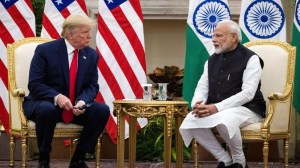Job for a job
If you deny Indians H1-B,India can deny Boeing,McDonnell-Douglas their contracts
This newspaper is proud to have pushed for the India-US civilian nuclear agreement,a landmark deal that we believe will change the entire paradigm of Indian foreign policy. Like the first financial reforms of 1991,the first attempt to realign Indias engagement with the world has been discussed and dissected,but is now reality and,thankfully,irreversible in terms of the shift in mindset it has ushered in.
That doesnt explain the burst of clientelism that the Indian states functionaries seem to have decided to indulge in. The most unacceptable aspect of this,for example,was on display during Foreign Secretary Shiv Shankar Menons recent visit to the United States: his claim that the question of the USs creeping protectionism,particularly towards the H1-B visa programme,could not even be raised bilaterally because it was a sovereign function of the US. Indeed. But the competitiveness of our companies and the movement of our people is also a core issue for India. And thats what diplomacy is about,isnt it? Raising our issues that both countries care about? Is Indias senior-most diplomat feeling so indebted to the US that he doesnt feel its worth talking about anyway?
Because it couldnt be about powerlessness. Nobody wants a trade war,and nobody should. But if the US government thinks that its own money mustnt suffer leakage to other economies in the course of the stimulus package and so will close off H1-B employment and put in Buy American clauses,it shouldnt also think that it is the only government with the power to do so. On Monday,the 2 billion sale of maritime jets to the Indian Navy was cleared by the US administration something that was needed to keep troubled airplane giant Boeings books looking good. Boeing,
General Electric,McDonnell-Douglas and General Dynamics would soon run to their contacts in Congress and the White House if Indias government began to look elsewhere. Heres the rub: Indias government has levers to apply. Indias administrators better start applying them. The nuclear deal was in this countrys interest,which is why it was a good thing. Just because it was in the USs interest as well wasnt a reason to oppose it. But everything in the USs interest isnt in ours something our establishment needs to keep continually in mind.
- 01
- 02
- 03
- 04
- 05































